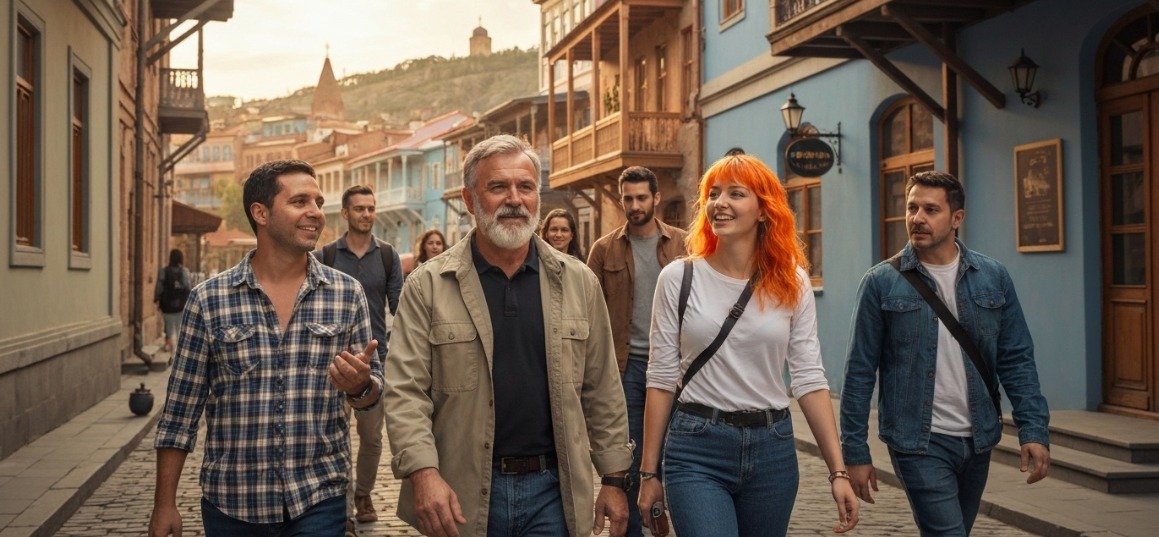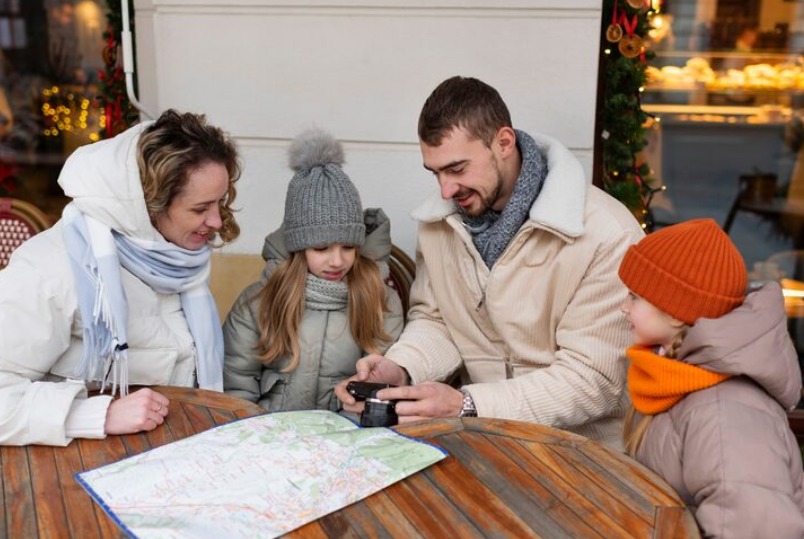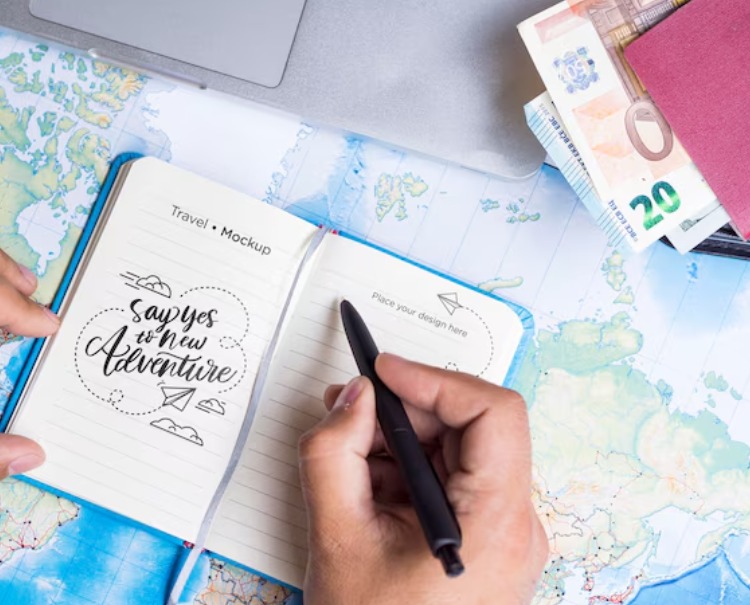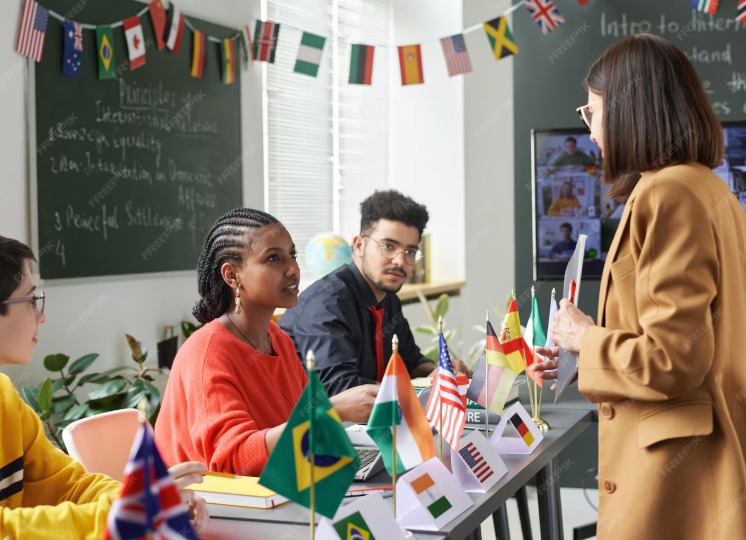October 20, 2025
Expats StoriesBeyond the Honeymoon: The Real Expat Life in Georgia
.jpeg)
Introduction
This isn't just another guide; it’s a reflection on what it truly means to build a life far from home. We’ll follow the story of Alex and Ireina, a couple who, like thousands of others, moved to Georgia for opportunity and stayed for the structure they built themselves. Their journey mirrors the universal expat experience, touching on the highs of entrepreneurial freedom and the lows of cultural isolation. Their story is the best way to understand the realities of everyday life beyond the postcard images.
The Allure of Georgia: Why Expats Are Drawn In

What’s the reality of Georgia’s appeal? For many, the initial draw is a powerful mix of freedom and affordability. The country presents itself as an accessible dream: a place with a low cost of living, the birthplace of wine, and a stunning landscape stretching from the bustling city center of Tbilisi to the serene Black Sea coast. You hear stories of delicious dishes, easy visas, and a welcoming spirit.
This combination of tangible benefits like low taxes and minimal bureaucracy and intangible charm is what pulls people in. But the real story begins when you unpack your bags and start living the day-to-day. The initial allure is just the first chapter, setting the stage for a much deeper and more complex journey of making a foreign land your home. Let’s explore the specific facets of this appeal.
Tbilisi as a Crossroads: East Meets West for Newcomers
Tbilisi is where the dream often takes root. It’s a city of contrasts, where sleek, modern architecture stands beside crumbling Soviet-era buildings and ancient, Italian-style courtyards. For newcomers like Alex and Ireina, this visual tapestry was intoxicating. Walking through central Tbilisi feels like peeling back layers of history, with each street corner telling a different story of its position at the crossroads of Europe and Asia.
This unique blend makes Tbilisi one of the most dynamic main cities for expats. It’s a hub of creative energy, filled with cozy cafés, co-working spaces, and a burgeoning startup scene. You can feel a sense of evolution and possibility in the air.
The reality, however, is that this energy also comes with the friction of a city in transition. While it offers a vibrant international community, it also demands patience as it navigates its rapid growth. It’s a place that is constantly redefining itself, and living here means being part of that unpredictable, exciting process.
The Promise of a Low Bureaucracy Country
What’s the risk of believing in a bureaucratic paradise? Georgia is famous for its low bureaucracy, and in many ways, it delivers. The experience at a Public Service Hall can be astonishingly efficient. Simple tasks like registering a business or inquiring about a residence permit can often be completed with a speed that feels revolutionary compared to many Western countries.
For Alex and Ireina, this was a huge part of the appeal. The idea of not being bogged down by endless paperwork felt like a breath of fresh air. They heard they could open a bank account with just a passport and handle real estate transactions with relative ease.
However, the risk lies in assuming this simplicity applies to everything. While straightforward processes are a hallmark, navigating more complex issues can reveal inconsistencies. Rules can be vaguely explained, and different officials might offer conflicting advice, especially if you don’t speak the language. The promise of low bureaucracy is real, but it’s not a magic wand for every administrative challenge.
Why Families, Entrepreneurs, and Adventurers Choose Georgia

What’s the reward for taking the leap? For each type of expat, Georgia offers a distinct prize. For entrepreneurs, the reward is one of the most favorable tax systems in the world. With low tax rates for self-employed individuals and a simple registration process, it’s a fertile ground for startups. The dream of launching a business without a huge initial investment is very much alive here.
For families and remote workers, the reward is a higher quality of life for a fraction of the cost. The amount of money needed for daily expenses is significantly lower than in most of Europe or North America. This financial freedom allows for more travel, more dining out, and less stress about month-to-month finances. Adventurers are rewarded with a diverse and accessible natural playground.
The Tbilisi Expat Community: First Impressions and Realities
The reality of expat life anywhere is that community is everything. In Tbilisi, the first impression is one of a vibrant, welcoming, and diverse expat scene. Facebook groups are buzzing with activity, offering advice on everything from finding an apartment to navigating the enrollment process for the QSI International School. It’s easy to feel like you’ve instantly found your tribe.
The best part is the shared sense of discovery. Everyone is, in some way, figuring things out together. You’ll meet people at cafés, through school events, or at weekend gatherings, all eager to share their stories and tips. This initial social safety net is a huge comfort for newcomers.
However, the long-term reality is more nuanced. The expat community can sometimes feel like a bubble, insulating you from deeper cultural integration. Friendships can be transient as people’s visas expire or their life plans change. Building a lasting community requires a conscious effort to connect not just with other foreigners but with Georgians themselves, a step many find challenging but ultimately rewarding.
A Beginner’s Guide to Moving to Georgia

So, you’re captivated by the allure. What’s the reality of actually making the move? It starts with understanding the practical steps. Georgia’s generous visa policies are a great starting point, but long-term living requires more than just showing up on a tourist visa. Securing a residence permit and organizing your affairs is crucial for a sustainable, high quality of life.
This section is your foundational checklist. It covers the essential documents, resources, and legal requirements for a smooth transition. Think of it as building the scaffolding for your new life before you start decorating.
What You’ll Need to Get Started: Documents, Finances, Connections
Before you even book a flight, getting your foundational paperwork in order is non-negotiable. The risk of overlooking a small detail can lead to major headaches down the line. For Alex and Ireina, this meant creating a master folder with digital and physical copies of every important document.
Your passport is the most obvious starting point, but think beyond that. Depending on your plans, you may need other notarized documents. For instance, if you plan to handle official business remotely or authorize someone to act on your behalf, a power of attorney will be essential.
Financially, you’ll need to prove you can support yourself. This doesn't mean you need a huge amount of money, but having proof of income or savings is required for certain residency programs. Here’s a basic checklist to begin with:
- A valid passport with at least six months of validity remaining.
- Proof of income or sufficient savings (e.g., bank statements showing at least $2,000/month for the "Remotely from Georgia" program).
- Notarized copies of important documents like birth certificates or marriage certificates, if applicable.
- Contact information for connections or resources on the ground in Georgia.
Essential Resources for Expats: Housing, Schools, Networks
Once you arrive, your focus will shift to building a life. What’s the reality of finding your footing? It’s about tapping into the right resources. For housing, while online portals are a good start, the real estate market is best navigated with a trusted local agent who understands the nuances of different neighborhoods and rental agreements.
For families, choosing an international school is a top priority. Researching options like the British International School of Tbilisi or QSI well in advance is crucial, as enrollment processes and waitlists can vary. Beyond the formal institutions, your most valuable resource will be the expat network.
Facebook groups are indispensable for real-time advice on everything from setting up a utility bill to finding a reliable pediatrician. These informal networks provide the practical wisdom that guidebooks miss. Here are some key resources to tap into:
- Local real estate agents for navigating the rental market.
- Websites and admissions offices for international schools.
- Expat-focused Facebook groups like "Tbilisi Expats" and "Expats in Georgia."
- Networking events and co-working spaces to build professional and social connections.
Navigating Georgia’s Entry Requirements and Visas
Georgia’s visa policy is famously liberal, which is a major reward for many expats. Citizens from over 90 countries can enter and stay for up to a full year on what is effectively a tourist visa. This gives you an incredible amount of time to explore the country and decide if it’s the right fit without immediate pressure.
You can arrive at major entry points like Tbilisi International Airport or Kutaisi Airport and receive your stamp. There is no complex Georgian visa application to fill out beforehand for these nationalities. This policy removes a significant barrier to entry that exists in many other countries.
However, the risk is becoming too comfortable with this one-year stay. If you plan to live and work in Georgia long-term, you cannot simply “reset” your visa by crossing a border and coming back. You must apply for a proper residence permit through a Public Service Hall before your year is up. Key points to remember are:
- Check if your nationality is on the one-year visa-free list.
- This stay is intended for tourism and exploration, not long-term settlement.
- Do not overstay your welcome; penalties can be strict.
- Begin the residency application process well before your initial year expires.
Understanding Georgia Residency Options for Foreigners
Securing a residence permit is the first step toward building a stable life in Georgia. This is where you move from being a long-term visitor to a legal resident. The process involves demonstrating your ties to the country, whether through work, business, or property ownership. A temporary residence permit is the most common path for expats.
Becoming a tax resident is a separate but related concept. You typically achieve this status by spending more than 183 days in the country within a 12-month period, which has significant implications for how your income is taxed.
Understanding the different types of permits is crucial. The requirements vary, so choosing the right one depends on your individual circumstances.

Step-by-Step Process for Relocating to Georgia
The big picture is one thing, but the reality of relocation lies in the details. This step-by-step guide breaks down the process into manageable actions. For those moving for the first time, this structured approach can turn an overwhelming task into a series of achievable goals. It’s about doing your due diligence and being prepared.
Even with tools like Google Translate and friendly locals, moving to a new country requires a plan. From researching neighborhoods in main cities to setting up your bank account, each step builds on the last. Let’s walk through the process.
Researching the Tbilisi Expat Community and Neighborhoods
Your first practical step is to understand the landscape of Tbilisi itself. The city is a patchwork of neighborhoods, each with its own distinct character. Do you want the historic charm and tourist buzz of the Old Town, the leafy, family-friendly vibe of Vake, or the edgier, more artistic feel of areas near Marjanishvili Metro Station?
Joining Facebook groups is the best way to get on-the-ground insights. Ask questions, read through old posts, and get a feel for the different areas. People will share their experiences about noise levels, proximity to parks, and the quality of local markets.
Here are some neighborhoods to start your research:
- Vake: Upscale, green, and popular with expat families.
- Sololaki: Historic, atmospheric, and right next to the Old Town.
- Saburtalo: A large residential area with good amenities and more affordable options.
- Marjanishvili: A culturally diverse area with beautiful architecture and a vibrant theater scene.
Preparing Your Paperwork: Passports, Visas, and KYC
With your target neighborhoods in mind, the next step is a paperwork deep-dive. This is the "structure before you move" phase. The risk of not being prepared here is significant, as missing documents can delay everything from opening a bank account to applying for your Georgian visa or residency.
Gather all essential documents, including your passport, birth certificates, and any professional qualifications. Make multiple copies and digital backups. You will also need to prepare for "Know Your Customer" (KYC) checks, which banks and other institutions perform. This often involves providing proof of address and source of funds.
Although Georgia’s bureaucracy can be efficient at the Public Service Hall, arriving with a complete and organized file of documents is the best way to ensure a smooth process. This preparation is what separates a stressful first week from a successful one. Your pre-move checklist should include:
- Ensuring your passport is valid for at least another year.
- Getting official documents (like marriage certificates) apostilled if necessary.
- Preparing recent bank statements to satisfy KYC requirements.
- Translating key documents into Georgian if required for a specific application.
Finding Accommodation: Rental Market and Local Agents

Finding a place to live is often the most pressing task upon arrival. The reality of Tbilisi’s rental market is that it moves fast, and the best places don’t stay listed for long. While websites provide a starting point, they don’t always show the full picture.
The reward for finding a good local real estate agent is immense. They have access to listings that never make it online and can negotiate terms on your behalf. They can also help clarify what’s included in the rent, such as whether it covers the first utility bill or any building maintenance fees.
Be prepared to act quickly when you find a place you like. The standard practice is to pay the first month's rent and a security deposit (usually equal to one month's rent) upfront. Here are some tips for navigating the rental market:
- Start with online platforms like MyHome.ge and Place.ge to understand pricing.
- Hire a recommended local agent for access to better properties.
- Clarify all terms of the lease, including the duration and utility payment responsibilities.
- Visit properties in person; photos can be deceiving, especially regarding the condition of the building.
Setting Up Utilities, Internet, and Daily Essentials
Once you have your keys, the next step is to make your new apartment a home. This means setting up the essentials: electricity, gas, water, and internet. The reality is that this process can be a little confusing for newcomers, especially with language barriers. Often, your landlord or real estate agent can help get these accounts transferred to your name.
Internet service providers like MagtiCom and Silknet offer reliable, high-speed connections, a modern convenience that is crucial for remote workers. Setting up an account is usually straightforward, but it’s one of the first things you’ll want to do.
Managing your utility bill payments is made easy through internet banking or pay boxes (terminals found in shops and on the street all over the city). This system is surprisingly efficient.
- Ask your landlord to assist with transferring utilities into your name.
- Visit a branch of a major internet provider like MagtiCom to set up a home internet plan.
- Familiarize yourself with the local pay boxes for easy bill payments.
- Get a local SIM card for your phone immediately; it’s cheap and essential for communication.
Opening Your First Georgian Bank Account

Opening a local bank account is one of the simplest and most rewarding tasks for a new expat in Georgia. Major banks like Bank of Georgia and TBC Bank are very accustomed to foreign clients and have English-speaking staff in most central branches. The process is remarkably fast and efficient.
For Alex and Ireina, walking into TBC Bank and walking out less than an hour later with a multi-currency account felt almost too good to be true. All they needed were their passports. This simple step was a huge key to unlocking their new life, allowing them to pay bills, receive payments, and manage their finances locally.
Having a local bank account simplifies everything. While KYC regulations have become tighter in recent years, the basic process for a personal account remains straightforward for most nationalities. To open your account, you will typically need:
- Your passport.
- A local Georgian phone number.
- Sometimes, proof of address (like a rental contract), though not always for a basic account.
- To complete the bank's KYC form.
Registering for Residency and Healthcare Access
With your basic needs met, it's time to focus on long-term structure. This means formally registering for a residence permit at the Public Service Hall. This step is critical for anyone planning to stay beyond the initial visa-free year. The risk of delaying this is having to leave the country and disrupt the life you've started to build.
Alongside residency, you must consider healthcare. While you can pay out-of-pocket for minor issues, having proper health insurance is non-negotiable for serious medical needs. The public system is not what most expats are used to, so private international health insurance is the standard choice.
This provides access to high-quality private clinics with English-speaking doctors. Securing both your residence permit and health insurance is the foundation of your long-term security in Georgia.
- Identifying the correct type of residence permit for your situation.
- Gathering all required documents for your application at the Public Service Hall.
- Researching and purchasing a comprehensive international health insurance plan.
- Identifying the top private clinics and hospitals in your city.
Building Social Connections and Support Systems
The final and perhaps most important step is to build your community. The reality is that a successful relocation isn't just about logistics; it's about creating a sense of belonging. The best way to do this is to be proactive. Don't wait for invitations; create opportunities.
For those with kids, school is a natural hub. For others, particularly those in remote work, it requires more effort. Join clubs, attend workshops, and volunteer. Say "yes" to invitations, even if you're tired. The friendships you build in the first few months will become your support system for your everyday life.
These connections are your safety net for the challenges ahead, from navigating cultural misunderstandings to celebrating small victories. They are the reward that makes all the paperwork and planning worthwhile. Here are some ways to start building your network:
- Actively participate in relevant Facebook groups, moving from online comments to in-person meetups.
- Join a co-working space to connect with other professionals.
- Take a class whether it’s Georgian language, cooking, or pottery.
- Explore your hobbies and find local groups dedicated to them.
Raising Kids Abroad
What’s the reality of raising a family in Georgia? It’s a delicate balance of incredible opportunity and unique challenges. Parenting abroad means navigating a different education system and helping your children form their identity between worlds. The reward is raising truly global, adaptable, and bilingual kids.
The risk, however, is that they may feel rootless, caught between a culture they live in but don't fully belong to and a "home" culture they barely know. Schools like the QSI International School and the British International School of Tbilisi offer excellent education but also create a distinct "expat bubble." We’ll explore this complex dynamic.
International Schools in Tbilisi: Curriculum and Community
For most expat families in Tbilisi, the choice comes down to a handful of top-tier international schools. Institutions like the QSI International School and the British International School of Tbilisi offer curricula (like the American or British system) that allow for a seamless transition to universities worldwide. The quality of education is high, with small class sizes and experienced international teachers.
These schools become the center of the expat family community. The school gates are where parents connect, friendships are formed, and social events are organized. This ready-made community is a tremendous support system, especially for families new to the country.
However, the reality is that these schools are expensive and can feel isolated from the broader Georgian education system. While they provide a world-class education, they exist as separate ecosystems. The curriculum might include Georgian language classes, but the primary culture of the school is distinctly international, not local.
Bilingual Education and Cultural Integration Challenges

The dream is for your children to become effortlessly bilingual, soaking up the local language on the playground. The reality of cultural integration for kids in international schools is more complicated. While they may learn basic words in Georgian, their primary language of instruction and socialization is English. This creates a barrier to forming deep friendships with local Georgian children.
Their cultural education becomes a blend of what they learn at school, what you teach them about your home culture, and what they absorb from daily life in Georgia, like enjoying Georgian food. This can be enriching, but it can also be confusing.
The challenge for parents like Alex and Ireina was to bridge this gap. They made a conscious effort to expose their children to Georgian culture outside of school, from weekend trips to the countryside to learning about local traditions. True integration doesn't happen automatically; it requires a deliberate and sustained effort from the whole family.
Social Life for Children: Friendship Gaps and Adaptation
The social life of an expat child is often rich and diverse. At a school like QSI International School, their classmates come from dozens of different countries. This exposure to global cultures is an incredible gift. They learn to navigate different social cues and perspectives from a very young age, making them highly adaptable.
However, the risk is the transient nature of these friendships. A best friend might move away at the end of the school year, a common reality in the expat world. These recurring "friendship gaps" can be emotionally challenging for children. Furthermore, their limited fluency in local languages can prevent them from joining local sports teams or neighborhood playgroups.
This is a core challenge of their everyday life. While they have a vibrant social circle within the school, they can feel like outsiders in their own neighborhood. Parents must be proactive in creating stability and fostering connections that go beyond the school's international bubble.
Parenting Between Worlds: Opportunities and Risks

Parenting in a foreign country is a constant navigation of opportunities and risks. The opportunity is to give your children a worldview that is broad, tolerant, and multifaceted. They get to experience a different lifestyle, one that might be slower, more family-oriented, and more connected to nature than a fast-paced life in a Western city center.
The risk is that they develop a "third culture" identity, feeling they don't fully belong anywhere. They are not quite Georgian, nor are they fully connected to their parents' country of origin. This can be a source of strength, giving them a unique perspective, but it can also lead to feelings of alienation.
For Alex and Ireina, parenting became about consciously building a family identity that embraced all parts of their experience. Their role was not just to provide, but to be cultural translators, helping their children make sense of their complex world. The reward of this intentional parenting is raising children who are not just citizens of one country, but citizens of the world.
Language Barriers and Cultural Immersion for Expats
What’s the reality of the language barrier? It's the single biggest hurdle to true integration. You can get by in Tbilisi with English and a little bit of Russian, using Google Translate for menus and learning a few basic words. You can enjoy the Georgian food and the hospitality without ever becoming fluent.
But living in a country is different from belonging to it. The risk of not learning the language is that you will always remain on the surface of the culture, an observer rather than a participant. Below, we'll discuss the challenges and rewards of tackling local languages.
Learning Georgian: Difficulties and Rewards
The blunt truth: the Georgian language is hard. With its unique script and complex grammar, it bears little resemblance to most languages that expats are familiar with. Many start with enthusiasm, learning basic words like "Gamarjoba" (hello) and "Madloba" (thank you), but fluency is a long and challenging road.
The risk is giving up too early. It’s easy to rely on Google Translate and the English-speaking younger generation, but this limits your everyday life. You miss out on the rich conversations with market vendors, the stories from your elderly neighbors, and the nuanced humor that defines a culture.
The reward, however, is immense. Even a little effort is deeply appreciated by Georgians. As Alex put it after a decade, "If we had known we’d stay, we’d have learned it from day one." Learning the language unlocks a deeper layer of the country. It’s the key to moving from an expat to a local.
Everyday Communication: English, Russian, and Local Languages
In the main hubs of Tbilisi, you can navigate daily life with a combination of languages. English is widely spoken in the tourism and hospitality sectors, and by many young people. In areas with diverse communities, like near Marjanishvili Metro Station, you will hear a mix of languages on the street.
Russian is also still widely understood, particularly by the middle-aged and older generations. This can be a useful bridge for expats who speak Russian but not Georgian. You can order in restaurants, take taxis, and handle simple transactions without much trouble.
However, this linguistic comfort zone has its limits. Step outside the city center or into a government office, and you’ll find that Georgian is the only language spoken. Relying on English and Russian is a short-term solution, not a long-term strategy for integration into the local languages and culture.
Integrating into Georgian Culture: Tips for Newcomers
What’s the reward for pushing past the comfort zone? True integration. It’s about more than just language; it’s about participating in the culture. The easiest and most enjoyable way to start is through food. Georgian culture revolves around the supra (feast), and sharing a meal is a gesture of friendship and respect.
Show genuine interest. Ask questions about the delicious dishes, learn the stories behind them, and visit the markets to see the fresh local produce. This curiosity is a bridge to connection.
Integration is an active process. It means accepting invitations, showing up for local holidays, and making an effort to understand the traditions that shape the society around you. Here are a few practical tips:
- Learn to make a proper toast; it’s central to any Georgian gathering.
- Take a wine tour in Kakheti and learn about the 8,000-year-old winemaking tradition.
- Shop at local markets instead of just supermarkets.
- Accept invitations to a supra whenever you can—it’s the heart of Georgian hospitality.
Doing Business in Georgia: From Start-Up to Sustainability

For many expats, including remote workers and entrepreneurs, Georgia’s business-friendly environment is a primary draw. The headline features—low tax rates and easy company registration—are incredibly appealing. It’s a country where starting a business seems refreshingly simple.
But as Alex discovered, “Starting over is easy here. Succeeding isn’t.” The journey from a simple start-up to a sustainable business involves navigating Georgian banks, understanding your obligations to the Department of Revenue, and building a real market presence. Let’s explore the reality, risks, and rewards.
How to Register a Company in Georgia
The reality is that registering a company in Georgia can be done in as little as one day. The process at the Public Service Hall is streamlined and efficient. As a foreigner, you can register as an Individual Entrepreneur or set up a Limited Liability Company (LLC) with minimal fuss.
This ease of setup is a massive reward. It removes the high barrier to entry that exists in many other countries, allowing you to test a business idea without a huge upfront investment in legal fees and time. You can walk in with your passport and walk out as a registered business owner.
However, it’s wise to hire a local lawyer or consultant to ensure everything is done correctly, especially if you’re not physically present and need to use a power of attorney. They can also help you register with the Department of Revenue for tax purposes. The basic steps are:
- Choose your business structure (e.g., Individual Entrepreneur).
- Visit the Public Service Hall with your passport to register.
- Open a corporate bank account for your new business.
- Register with the tax authorities to get your taxpayer ID.
Georgia Banking System Explained for Expats
The Georgian banking system is modern, efficient, and generally welcoming to foreigners. The two largest players, Bank of Georgia and TBC Bank, dominate the market and offer a full suite of services, including excellent internet banking platforms in English. For an expat, this is a huge convenience.
These platforms allow you to manage your finances, pay bills, and make transfers with ease. Multi-currency accounts (in GEL, USD, and EUR) are standard, which is a major benefit for anyone earning income from abroad or doing international business.
However, while personal accounts are easy to open, corporate banking has become more complex. Georgian banks are under increasing pressure to comply with international regulations, leading to stricter due diligence. The initial ease can sometimes be followed by more scrutiny, which is a risk entrepreneurs need to be aware of.
Navigating KYC and CRS in Georgia: What Foreigners Should Know
The reality of global banking today is increased scrutiny, and Georgia is no exception. While opening a personal account is still relatively simple, a deeper level of "Know Your Customer" (KYC) due diligence is now standard, especially for business accounts or large transfers. Banks want to know who you are, where your money comes from, and what your business does.
Furthermore, Georgia is a signatory to the Common Reporting Standard (CRS), an information-sharing agreement designed to combat tax evasion. This means your financial information will be automatically shared with the tax authorities in your country of tax residency. The days of "hiding" money in a Georgian account are over.
The risk for foreigners is being unprepared for these checks. Having your documents in order, being transparent about your source of funds, and demonstrating legitimate ties to Georgia are crucial. This isn't a hurdle to scare you off, but a modern reality of banking that requires proper planning and due diligence.
Tax Benefits and Responsibilities for Entrepreneurs

The reward for entrepreneurs in Georgia is its highly attractive tax system. The most famous is the 1% tax on turnover for Individual Entrepreneurs with a "small business status," applicable up to a threshold of 500,000 GEL per year. This is one of the lowest tax rates you’ll find anywhere in the world.
For corporations, profits are not taxed until they are distributed as dividends, which encourages reinvestment and growth. This favorable environment is a key reason why so many digital nomads and business owners flock to Georgia.
However, with these benefits come responsibilities. You must file monthly declarations with the Department of Revenue and maintain proper records. Becoming a tax resident (by spending 183+ days in the country) clarifies your obligations but also requires careful planning. It's highly recommended to work with a local accountant to ensure you remain compliant, as the rules can have nuances that are easy to miss.
Finding Local Partners and Business Networks
Starting a business is one thing; making it successful requires connections. The reality is that you can't do it alone. Building strong business networks and finding reliable local partners is essential for long-term sustainability. This is especially true if your business involves physical products, like sourcing local produce, or requires local expertise.
Expat-focused Facebook groups and events organized by groups like Nomad Capitalist can be a good starting point. They offer a community of peers who are navigating the same challenges and can share valuable insights and contacts.
However, the real reward comes from breaking out of the expat bubble and building relationships with Georgian business owners. This opens doors to new opportunities, provides a deeper understanding of the local market, and fosters true integration.
Here’s how you can start building your network:
- Attend industry-specific meetups and trade shows in Tbilisi.
- Join local business associations and chambers of commerce.
- Utilize LinkedIn to connect with professionals in your field.
- Hire local talent; your employees can be your best guides to the local business culture.
Navigating Residency, Citizenship, and Plan B Options
As the years passed, Alex and Ireina’s perspective shifted. The initial move was about opportunity; the long game was about security. This is where the concept of a "Plan B" becomes critical. For expats whose original passports may lose power or mobility, securing a solid residency or second citizenship is not a luxury, it's a necessity.
Freedom isn’t just about movement; it’s about options. A temporary residence permit is a good start, but what about permanent residency or even citizenship? This section explores the structural planning required to turn a temporary adventure into a secure, multi-generational home base.
Overview of Georgia Residency Options
The first step toward long-term security is obtaining a residence permit. Most expats start with a temporary residence permit, which is typically granted for one year and can be renewed. These permits are linked to your reason for being in the country, such as work, business, or study.
After living in Georgia for a number of years on a temporary permit, you can become eligible to apply for a permanent residence permit, which offers greater security. The application process for all permits is managed through the Public Service Hall.
It's important to distinguish between being a resident and a tax resident. You can hold a residence permit without meeting the 183-day requirement to be a tax resident, and vice versa. Understanding these distinctions is key to proper planning.

Applying for Georgian Citizenship: Process and Pitfalls
The ultimate step for integration is applying for Georgian citizenship. The reality is that this is a difficult path. Georgia does not typically allow dual citizenship, so you would likely have to renounce your original nationality. The standard path to naturalization requires living in the country for ten years, passing tests on the Georgian language, history, and law, and demonstrating ties to the country.
The process is rigorous and discretionary. There are no guarantees of approval, even if you meet all the formal criteria. The application is reviewed by various bodies, and a final decision is made by the President.
This is not a decision to be taken lightly. It involves a deep commitment to the country and a willingness to navigate a complex and sometimes opaque process. For most expats, permanent residency is a more realistic and achievable goal. The key requirements include:
- 10 years of continuous, legal residency.
- Fluency in the Georgian language.
- Knowledge of Georgian history and the basics of law.
- Proof of employment or business activity in Georgia.

Multiple Passports and Backup Plans for Expats
For global citizens, the ultimate form of security is having options. This is the core philosophy behind building a "Plan B." For Alex and Ireina, whose original passports became less useful over time, this concept went from a theoretical idea to a practical necessity. It’s not about abandoning Georgia; it’s about creating a portfolio of residencies and citizenships that provides stability in an unstable world.
Your Plan B might involve securing residency in another business-friendly country, investing in a citizenship-by-investment program, or exploring ancestral citizenship options. The goal is to diversify your political risk so that your family's future is not tied to the fate of just one nation. It is the ultimate expression of taking control of your own sovereignty.
Visa Renewals and Long-Term Security
While you work on your long-term Plan B, the immediate reality is managing your legal status in Georgia. This means staying on top of renewals for your temporary residence permit. The process is not automatic; you must re-apply each year and continue to meet the original criteria.
The risk is becoming complacent. A change in your business status, a lapse in your paperwork, or a shift in immigration policy could jeopardize your renewal. It’s crucial to treat every renewal with the same diligence as your first application.
This annual process is a reminder that a temporary permit is just that temporary. It underscores the importance of having a long-term strategy, whether that’s aiming for permanent residency in Georgia or building a parallel Plan B elsewhere. To ensure smooth renewals:
- Start the renewal process well in advance of your permit’s expiration date.
- Keep meticulous records of your business income, tax payments, and physical presence in the country.
- Stay informed about any changes to immigration laws.
- Consult with an immigration lawyer if your situation becomes complex.
Conclusion
In conclusion, the journey of expat life in Georgia is rich with both challenges and rewards. While the initial allure of picturesque landscapes and low bureaucracy draws many to this vibrant country, the realities of adjusting to a new culture, language, and community can be daunting. However, embracing these challenges often leads to profound personal growth and unforgettable experiences. From navigating the intricacies of raising children abroad to launching a successful business, every aspect of life in Georgia offers unique lessons and opportunities for connection. If you're contemplating this adventure, remember that preparation is key. To help you plan your move effectively, book a consultation with us today and embark on your own journey with the right guidance and support.
This isn’t a glossy travel vlog,
it’s the raw truth about raising families, building businesses, and deciding if Georgia is just a stopover or a permanent home.
By the end, you’ll see why some expats thrive here for decades… while others quietly pack up and move on.
Follow The Jerz Way
⚠️ DISCLAIMER: This content is for informational purposes only. It is not tax, legal, or financial advice. Always consult a qualified professional before making decisions.
02
Action Plan & Document Collection
We create a tailored action plan aligned with your chosen service(s). This stage includes gathering required documents and handling essential tasks such as translations, apostilles, and genealogical research.
